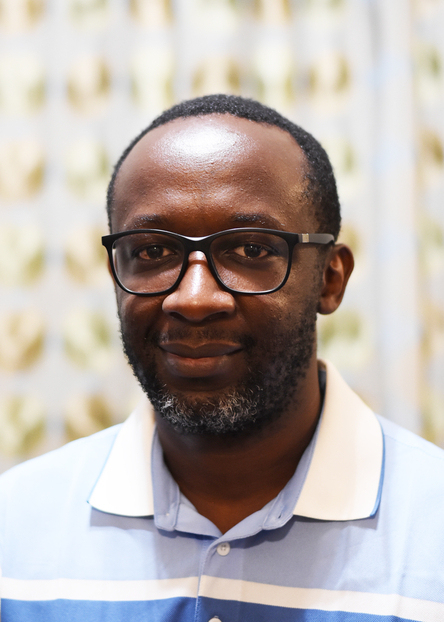
Andrew Maina, originally from the east African country of Kenya, says his lifelong interest in science led him to enroll in the University of Arkansas at Pine Bluff’s (UAPB) graduate program in aquaculture/fisheries.
“My father was a pharmacist, and I also started to get interested in science in elementary school,” he said. “In high school, I became really interested in biology. My love for the outdoors and wildlife started in Kenya but continues to play a part in my life in my new home of North Carolina. I frequently go hiking and birdwatching.”
During his undergraduate studies at the University of Eastern Africa in Baraton, Kenya, Maina took a course on marine biology. This experience made him curious about studying a discipline of science largely new to him.
“I became interested in further studying fish because they have unique physiologies compared to other groups of animals,” he said. “I visited with Dr. Rebecca Lochmann, chair of the UAPB Department of Aquaculture and Fisheries. Our conversation about her research on catfish piqued my interest. I had previously taken a graduate course in chemical separations and biochemistry at the University of Florida, which gave me the theoretical background in the type of tools and techniques used in her lab for research.”
In 2012, he enrolled in the graduate program and started conducting research on channel catfish nutrition under the mentorship of Dr. Lochmann.
“In the lab, I was able to build an entirely new skill set as we used biochemistry techniques and separation chemistry to investigate the nutritional composition of fish muscle and whole fish,” Maina said. “Dr. Lochmann was influential in providing guidance throughout my graduate studies and also in giving me opportunities to attend large conferences and present my original research.”
After graduating from UAPB in 2016, Maina was employed by Smithers, a company that provides independent testing services for a range of industries and products.
“I was hired as a study director for channel catfish nutrient equivalency studies with various genetically modified organisms (GMO) grain varieties meant for export to the Asian market,” he said. “We were testing catfish feeds formulated to incorporate GMO grains. Our job was to ensure GMO grains used in these feeds were similar enough to non-GMO strains. We also made sure the feeds did not have any negative effects on catfish growth.”
Maina currently works for Catalent, Inc., a global pharmaceutical company, where he is responsible for performing drug substance and drug product stability analysis.
“Before they hit the market, medicines must be tested to make sure whatever components listed on the label are actually in the tablet in those precise measurements,” he said. “Our work helps ensure that any drug released to the market is in full compliance with U.S. Food and Drug Administration standards.”
Maina said he recommends an education at the UAPB Department of Aquaculture and Fisheries for students looking to gain quality research experience. In addition to the labs on campus, he said students can also pursue collaborative opportunities with organizations such as the Harry K. Dupree Stuttgart National Aquaculture Research Center in Stuttgart, Arkansas.
“The research skills I gained at UAPB continue to help me in my career,” he said. “During my studies, I enjoyed working with professors and students from different backgrounds on research that truly supported Arkansas and the region.”






